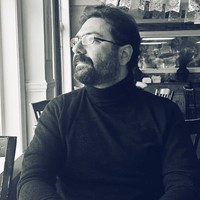
Axel Corlu
Born in Izmir, Turkey, to a Levantine (Italian/Greek/French/Armenian) family, Dr. Corlu has a B.A. in Political Science and Public Administration from Bilkent University (1996), an M.A. in History from Bilkent University (1999), an M.A. in Intelligence Studies from American Military University – APUS (2012), and a Ph.D. in History from Binghamton University-SUNY (2011). He has also studied Sociology at Middle East Technical University (1996-98).
Since 2002, he has taught history courses at SUNY-Binghamton, SUNY-Cortland, University of Mary Washington, and Georgia Gwinnett College on the U.S., the Ottoman Empire, the Byzantine Empire, and the Middle East, as well as thematic courses such as History of Warfare and History of Food.
He is a native speaker of Greek, Italian and Turkish.
Supervisors: Melvyn Dubofsky, Nunzio Pernicone, Donald Quataert, and Caglar Keyder
Since 2002, he has taught history courses at SUNY-Binghamton, SUNY-Cortland, University of Mary Washington, and Georgia Gwinnett College on the U.S., the Ottoman Empire, the Byzantine Empire, and the Middle East, as well as thematic courses such as History of Warfare and History of Food.
He is a native speaker of Greek, Italian and Turkish.
Supervisors: Melvyn Dubofsky, Nunzio Pernicone, Donald Quataert, and Caglar Keyder
less
InterestsView All (37)
Uploads
Publications in Newspapers and Online Sources by Axel Corlu
Papers by Axel Corlu
As a discourse and a set of institutionalized policies, heritage-making necessarily involves a complex mix of identities, politics, and power. Simultaneously, the sites, objects and practices that heritage seeks to encompass and preserve are myriad, defined by disparate histories that are not equally suitable to the ends that heritagization seeks. Hagia Sophia, which stood at the symbolic center of two great empires and continues to inspire identification on the part of two religions, represents a unique example of this dynamic. It is no surprise that Hagia Sophia is still claimed by different religious actors, in different languages: it is a witness to and protagonist of a plethora of legends and histories, which simultaneously inform and unsettle recent decisions to manipulate heritage discourse for political gains.
On July 10, 2020, Hagia Sophia once again became a mosque when the Turkish Council of State revoked its museum status, which had been granted in 1934 in an attempt to diffuse its imperial connotations and open the building to researchers. Two weeks later, despite the Covid-19 pandemic, tens of thousands of worshippers gathered to celebrate the opening with an initial Friday prayer. The reopening of Hagia Sophia as a mosque was the result of a long campaign, most recently led by Turkey's ruling party, the AKP. When President Erdoğan called for the reconversion of Hagia Sophia as a “return to its origin” (aslına rücu), he initiated another recontextualization of the monument and the elevation of only one of its many histories.
Against this backdrop, our seminar will address three larger themes in relation to Hagia Sophia as a space and place, both today and in the past. First, we aim to unpack the tension between the anti-imperialist discourse that accompanied the museum’s reconversion, and the language and symbolism of (re)conquest that marked the reopening celebrations. Secondly, in light of proposals to share Ayasofya by opening it for prayer on the part of different communities on various Christian and Islamic holidays, we seek to understand Hagia Sophia in the wider context of shared sacred spaces. Third, we hope to sharpen our perspective on the dense relationship among space, aesthetics, and historicity that Hagia Sophia embodies, especially in relation to its intangible Byzantine heritage.
Propaganda by the deed anarchists were not terrorists, or bloodthirsty madmen; they had a sophisticated understanding of power and conflict, and their methods and ideas reflected their response to empower themselves given the limitations of their context. The states that responded to their activities, while in very different circumstances, and with very different priorities otherwise, used remarkably similar strategies and priorities in “dealing with” the “anarchist threat.”
This study draws from archives in the United States, the Netherlands, Switzerland, Italy, and Turkey, utilizing primary sources in five languages, to present an overview of how propaganda by the deed anarchists formulated their ideas, connected them to their material reality, and interacted with existing structures of power on their own terms. At the same time, using government surveillance reports, police records, and diplomatic correspondence from state archives in the U.S., Italy, and Turkey, it provides never-before-seen statistical analysis in this field, and develops the existing theories of causation as they apply to state responses to propaganda by the deed anarchists, in the United States, Italy, and the Ottoman Empire, at the turn of the century.
Southeast World History Association (SEWHA)
Periodization and Temporality in World History
October 6 – 7, 2017
University of North Georgia, Dahlonega Campus
"Levant & Europe: Shipping and Trade -- Networks of People and Knowledge"
Edited by Axel B. Corlu
Caglar Keyder
Funda Aditatar
Frank Castiglione
Umit Eser
Vjeran Kursar
Anna Lia Proietti Ergun
Luca Orlandi
Aysin Sisman
Alyson Wharton-Durgaryan
Carole Woodall
https://thegarumexperiment.wordpress.com/
http://garum.umwblogs.org/